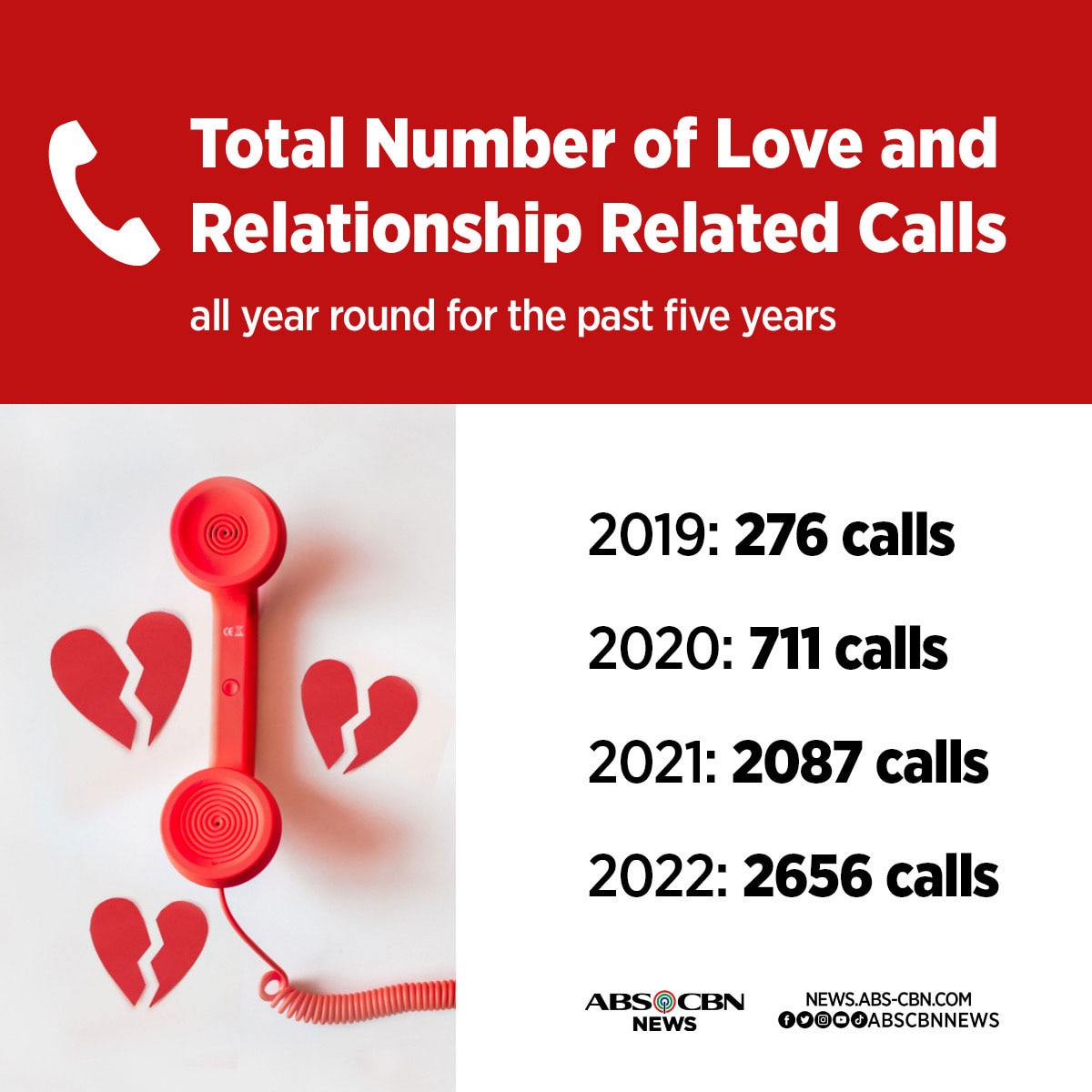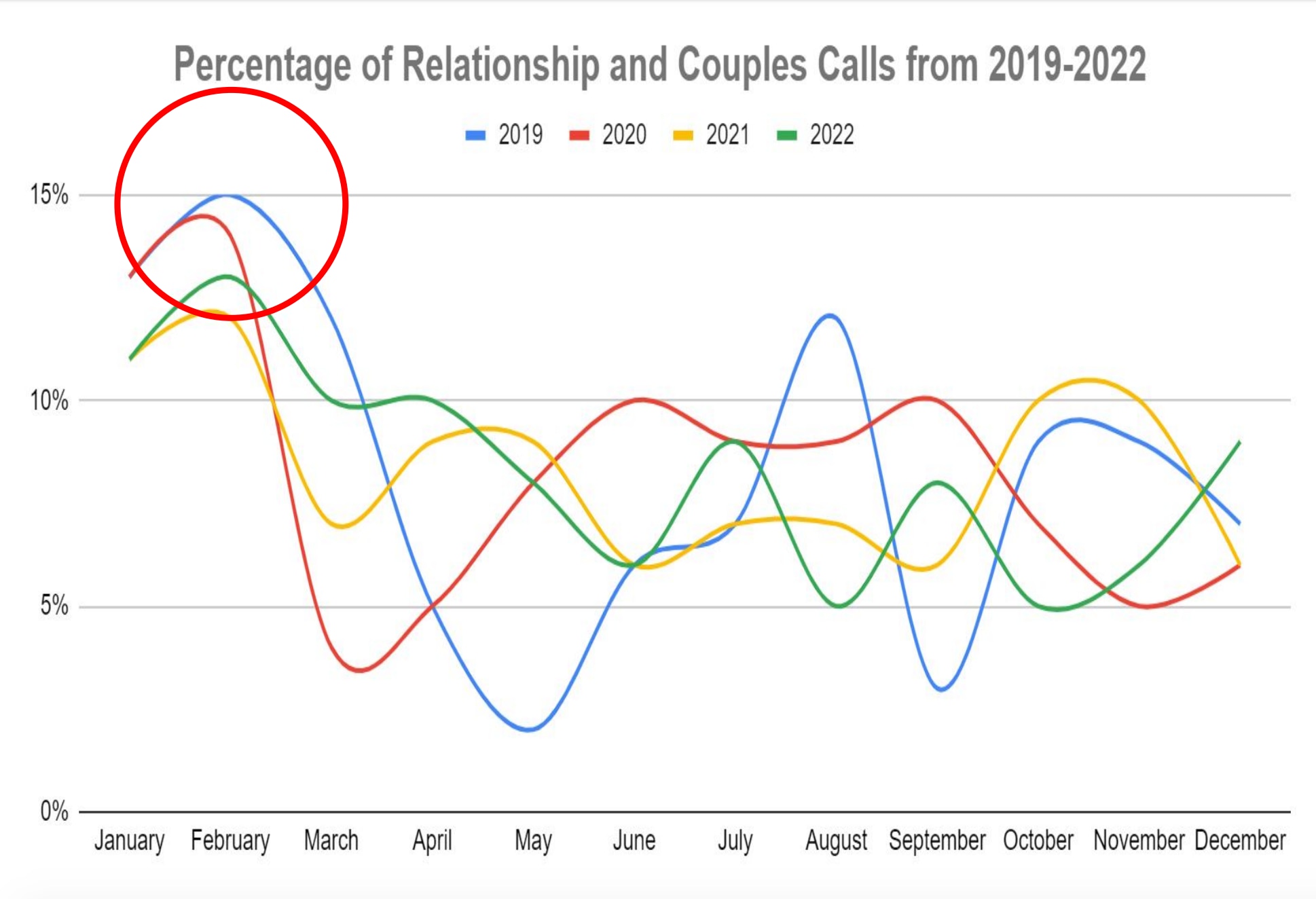Love problems prompt more calls to NCMH hotline during pandemic | ABS-CBN

Welcome, Kapamilya! We use cookies to improve your browsing experience. Continuing to use this site means you agree to our use of cookies. Tell me more!
Love problems prompt more calls to NCMH hotline during pandemic
Love problems prompt more calls to NCMH hotline during pandemic
Ianna Gayle Agus,
ABS-CBN News
Published Feb 14, 2023 07:33 AM PHT
|
Updated Feb 14, 2023 03:29 PM PHT
MANILA — Heartbroken callers seeking help from the National Center for Mental Health (NCMH) increased nearly 10-fold during the COVID-19 pandemic, which an expert said strained some relationships.
MANILA — Heartbroken callers seeking help from the National Center for Mental Health (NCMH) increased nearly 10-fold during the COVID-19 pandemic, which an expert said strained some relationships.
The NCMH's crisis hotline received 2,656 love-related calls last year, almost 10 times the 276 pre-pandemic calls recorded in 2019, data retrieved by ABS-CBN News showed.
The NCMH's crisis hotline received 2,656 love-related calls last year, almost 10 times the 276 pre-pandemic calls recorded in 2019, data retrieved by ABS-CBN News showed.
The hotline also responded to 2,087 calls linked to romantic relationships in 2021 and 711 love-related calls in 2020.
The hotline also responded to 2,087 calls linked to romantic relationships in 2021 and 711 love-related calls in 2020.
The NCMH said calls related to romance and other problems averaged around 2,000 a month at the onset of the pandemic, up from 200 to 300 monthly calls before the COVID crisis.
The NCMH said calls related to romance and other problems averaged around 2,000 a month at the onset of the pandemic, up from 200 to 300 monthly calls before the COVID crisis.
ADVERTISEMENT
“Overall, yung pandemic po kasi talagang may impact siya sa relationships,” said Gizelle Tugade, program coordinator of the NCMH crisis hotline and Center for Wellness.
“Overall, yung pandemic po kasi talagang may impact siya sa relationships,” said Gizelle Tugade, program coordinator of the NCMH crisis hotline and Center for Wellness.
“Yung mga tao, naka-experience sila ng anxiety in which may capacity to shape and strain a relationship. Anxiety can manifest as, halimbawa, irritability, anger. So, some individuals are prone to argue more,” she told ABS-CBN News.
“Yung mga tao, naka-experience sila ng anxiety in which may capacity to shape and strain a relationship. Anxiety can manifest as, halimbawa, irritability, anger. So, some individuals are prone to argue more,” she told ABS-CBN News.
(The pandemic had an impact on relationships. People experienced anxiety, which has a capacity to shape and strain a relationship. Anxiety can manifest as, for example, irritability, anger.)
(The pandemic had an impact on relationships. People experienced anxiety, which has a capacity to shape and strain a relationship. Anxiety can manifest as, for example, irritability, anger.)
Tugade also pointed out that “novelty” is a “component [of] good relationships.” But due to COVID lockdowns, some relationships became “idle” and “stagnant”, with partners getting cold towards each other, she said.
Tugade also pointed out that “novelty” is a “component [of] good relationships.” But due to COVID lockdowns, some relationships became “idle” and “stagnant”, with partners getting cold towards each other, she said.
Spending too much time together also takes away one’s “alone time” and “solitude” which are important to a person’s psychological well-being, Tugade said.
Spending too much time together also takes away one’s “alone time” and “solitude” which are important to a person’s psychological well-being, Tugade said.
ADVERTISEMENT
Some couples who experienced long-distance relationships due to lockdowns also faced difficulties, Tugade said.
Some couples who experienced long-distance relationships due to lockdowns also faced difficulties, Tugade said.
Problems crop up when people “spend too much [time] together or spend too much apart,” she said.
Problems crop up when people “spend too much [time] together or spend too much apart,” she said.
The most common love problems the NCMH observed were breakup and cheating. Other concerns included misunderstandings and conflict.
The most common love problems the NCMH observed were breakup and cheating. Other concerns included misunderstandings and conflict.
Tugade explained that despite the pandemic starting in 2020, the increase in calls to the NCMH was not as notable then compared to the succeeding years because love-related problems were just starting to accumulate. People were also more focused on survival in the first year of the pandemic.
Tugade explained that despite the pandemic starting in 2020, the increase in calls to the NCMH was not as notable then compared to the succeeding years because love-related problems were just starting to accumulate. People were also more focused on survival in the first year of the pandemic.
In-Touch, a non-profit organization that offers mental health services, observed a different trend in its crisis hotline.
In-Touch, a non-profit organization that offers mental health services, observed a different trend in its crisis hotline.
ADVERTISEMENT
It said it consistently recorded an increase in love and relationship-related problems in the month of February, with January having the second highest calls.
It said it consistently recorded an increase in love and relationship-related problems in the month of February, with January having the second highest calls.
With Valentine's Day celebrated in February, romantic relationships are often highlighted in social media, television, and advertisements during the month, In-Touch crisis line coordinator Dominic Limjap noted.
With Valentine's Day celebrated in February, romantic relationships are often highlighted in social media, television, and advertisements during the month, In-Touch crisis line coordinator Dominic Limjap noted.
“It leads to that fact na we tend to be more aware and mindful doon sa sariling quality ng relationships natin," Limjap said.
“It leads to that fact na we tend to be more aware and mindful doon sa sariling quality ng relationships natin," Limjap said.
"So, there may be cases that we tend to compare to other people, especially social media since, of course, always positive yung mga pino-post sa social media. ‘Di naman pinapakita doon yung mga negative parts ng relationships which is normal naman to have,” he added.
"So, there may be cases that we tend to compare to other people, especially social media since, of course, always positive yung mga pino-post sa social media. ‘Di naman pinapakita doon yung mga negative parts ng relationships which is normal naman to have,” he added.
(t leads to that fact na we tend to be more aware and mindful of the quality of our own relationships. There may be cases. that we that we tend to compare to other people, especially social media since, of course, always shows the positive. It does not show the negative parts of relationships which is normal naman to have.)
(t leads to that fact na we tend to be more aware and mindful of the quality of our own relationships. There may be cases. that we that we tend to compare to other people, especially social media since, of course, always shows the positive. It does not show the negative parts of relationships which is normal naman to have.)
ADVERTISEMENT
In-Touch said it responded to around 6,000 calls when the pandemic struck, double the 3,000 pre-COVID yearly average.
In-Touch said it responded to around 6,000 calls when the pandemic struck, double the 3,000 pre-COVID yearly average.
Calls related to love and relationship accounted for 3 to 15 percent of total calls in the whole year from 2019 to 2022, In-Touch said.
Calls related to love and relationship accounted for 3 to 15 percent of total calls in the whole year from 2019 to 2022, In-Touch said.
The most common concerns it recorded were communication, misunderstandings, and self-esteem and confidence.
The most common concerns it recorded were communication, misunderstandings, and self-esteem and confidence.
In-Touch and NCMH both observed that there were more female callers than male.
In-Touch and NCMH both observed that there were more female callers than male.
“Mas madalas po talaga female. Maybe it has something to do na mas open sila… and mostly sila po kasi yung pinagpapalit, iniiwan,” Tugade said.
“Mas madalas po talaga female. Maybe it has something to do na mas open sila… and mostly sila po kasi yung pinagpapalit, iniiwan,” Tugade said.
ADVERTISEMENT
(Callers are more often female. Maybe it something to do with women being more open and mostly, they're the ones who are left behind.)
(Callers are more often female. Maybe it something to do with women being more open and mostly, they're the ones who are left behind.)
Limjap agreed, saying society generally views females as more sensitive.
Limjap agreed, saying society generally views females as more sensitive.
"But I think there’s a different reason leading to these numbers. On the flip side of that, society has certain expectations from males, from boys, that they’re not allowed to feel or cry,” he said.
"But I think there’s a different reason leading to these numbers. On the flip side of that, society has certain expectations from males, from boys, that they’re not allowed to feel or cry,” he said.
For Tugade, couples should not pressure themselves into making grand gestures this Valentine's Day.
For Tugade, couples should not pressure themselves into making grand gestures this Valentine's Day.
“You’re not pressured to participate and you can show your appreciation or your affection towards your partner in other ways,” she said.
“You’re not pressured to participate and you can show your appreciation or your affection towards your partner in other ways,” she said.
ADVERTISEMENT
The NCMH and In-Touch crisis lines can be reached through the following numbers:
NCMH crisis line numbers
NCMH crisis line numbers
1800-1888-1553 Unlimited calls nationwide with one-time fee of Php7.50
SMART / SUN / TNT: 0908-639-2672
GLOBE / TM: 0966-351-4518 ; 0917-899-8727
1800-1888-1553 Unlimited calls nationwide with one-time fee of Php7.50
SMART / SUN / TNT: 0908-639-2672
GLOBE / TM: 0966-351-4518 ; 0917-899-8727
In-Touch crisis line numbers
In-Touch crisis line numbers
+63 2 8893 7603
+63 919 056 0709
+63 917 800 1123
+63 922 893 8944
+63 2 8893 7603
+63 919 056 0709
+63 917 800 1123
+63 922 893 8944
Read More:
mental health
National Center for Mental Health
NCMH
In-Touch
Valentine's Day 2023
love
relationships
dating
ADVERTISEMENT
ADVERTISEMENT




